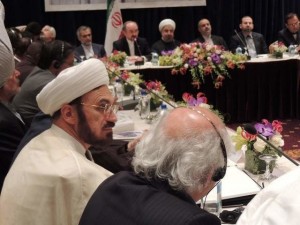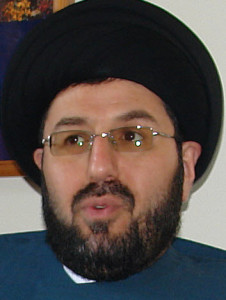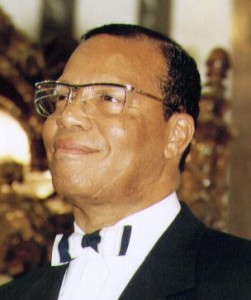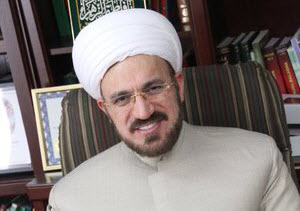
October 11-13
If the message of the Rohani visit to New York last month was intended to be one of moderation and reasonableness, a discordant note was struck when the president invited Louis Farrakhan to dinner.
Farrakhan, the leader of the Nation of Islam faith group, was among a large number of clerics, both Shia and Sunni, invited to dine with Rohani at his hotel hours after his speech to the United Nations.
The two most prominent Iranian clerics in the United States were among those at the dinner.
Farrakhan leads a splinter group that most Muslim clerics view as a perversion of Islam, although Farrakhan has made considerable effort to bring the Nation of Islam more in line with Sunni thought since becoming leader of the group.

But Americans mostly note him for his confrontational manner and virulent anti-Semitism, so Rohani’s invitation to Farrakhan didn’t convey good vibes to Americans.
Farrakhan has been received in Tehran in the past and was invited to a similar dinner in New York last year by then-President Mahmud Ahmadi-nejad, so Rohani was not breaking new ground by inviting Farrakhan.
Farrakhan is a fiery 80-year-old preacher who has previously counted the late Libyan strongman Moammar Qadhdhafi among his friends.
Fox News reported seeing what it called his “massive entourage and private security detail” departing the hotel around 10 p.m. Pedestrian traffic was stopped while the minister and his group piled into various cars with lights and sirens and New Jersey license plates.
Also in attendance at Rohani’s dinner was German Deputy Foreign Minister Peter Florin, who was elected president of the United Nations General Assembly on Tuesday. But most of those attending were Muslim-American figures, about 40 of them. As many were Arabs and knew no Farsi, instantaneous translation was provided.
Among the clerics were Imam Hassan al-Qazwini of the Islamic Center of America in Dearborn, Michigan, and Imam Mohammad Elahi of the Islamic House of Wisdom in Dearborn Heights, Michigan—both of whom left Iran some years after the revolution.

Also at the dinner was US Rep. Keith Ellison, Democrat of Minnesota, the first Muslim elected to Congress.
Qazwini and Elahi told the Detroit Free Press that Rohani said in his speech to the group that Muslims living in the US should try to be good role models by respecting and following the laws of the land in any nation they are living in.
“The message he brought was a promising one,” said Qazwini, the religious leader of the biggest mosque in Michigan. “He talked about his desire to improve the relationship, not only with the American government, but also between the Iranian people and the American people. He said there’s no reason the Iranian people can’t interact, communicate and exchange knowledge with the American people.”
Qazwini and Elahi are both Shias. Qazwini was a favorite of the George W. Bush Administration before many Republicans turned critical of Islam after the 9-11 attacks and Bush began to put some distance between himself and Muslims. In 2001, just days after becoming president, Bush had unveiled a plan for giving government support to religious charities. And standing right behind Bush while he signed was Qazwini, the sole Muslim among the 34 religious leaders invited to attend the signing at the White House.
Qazwini, 48, is an ethnic Iranian, but was born in Karbala, Iraq. At the age of 15 and shortly after the revolution, he went to Qom where he studied from 1980 to 1992. His teachers included Grand Ayatollah Hassan-Ali Montazeri.

In 1993, he moved to the United States where he directed the Azzahra Islamic Center in Los Angeles for four years. In 1997, he became the religious leader of The Islamic Center of America in Dearborn. He lives there now with his wife and three children.
Fluent in Farsi, Arabic and English, he has carved out a large presence in the Detroit area, speaking frequently to ecumenical groups and quoted frequently in the media as a Muslim representative.
His Shiite mosque is attended largely by Lebanese- and Iraqi-Americans. It has a membership of 2,000 families. He gives his sermons in English and Arabic.
The Detroit News says Qazwini’s speaking style is professorial rather than emotive, with the imam emphasizing logic. “We must use logic to verify and authenticate faith,” Qazwini has said. “We must use logic to form the best human society. We really don’t focus too much on ritual. Islam tells me we are worshipping God when I accept a quest. Reading is worship. Thinking is worship.”
Qazwini contends that Muslims must learn to make themselves heard in the American political system. He told The Boston Globe, “We don’t like to admit it, but the success of the Jewish people has inspired us.”
Elahi was born and reared in Iran. He was imprisoned for a while under the Shah, reportedly for lectures against political corruption. After the revolution, he was appointed to teach Islamic ethics and values in the Navy.
During the Iran-Iraq war, he visited the front line and was seriously injured and hospitalized for three months.
According to his biography on his mosque website, in 1986, he traveled to London and stayed there one year studying English and the lifestyle of Western society. In 1991, he attended a conference in San Francisco and was invited to stay in the United States.
Elahi’s biography says he holds a bachelor’s degree in sociology from Iran and a master’s in social science obtained in the United States.
